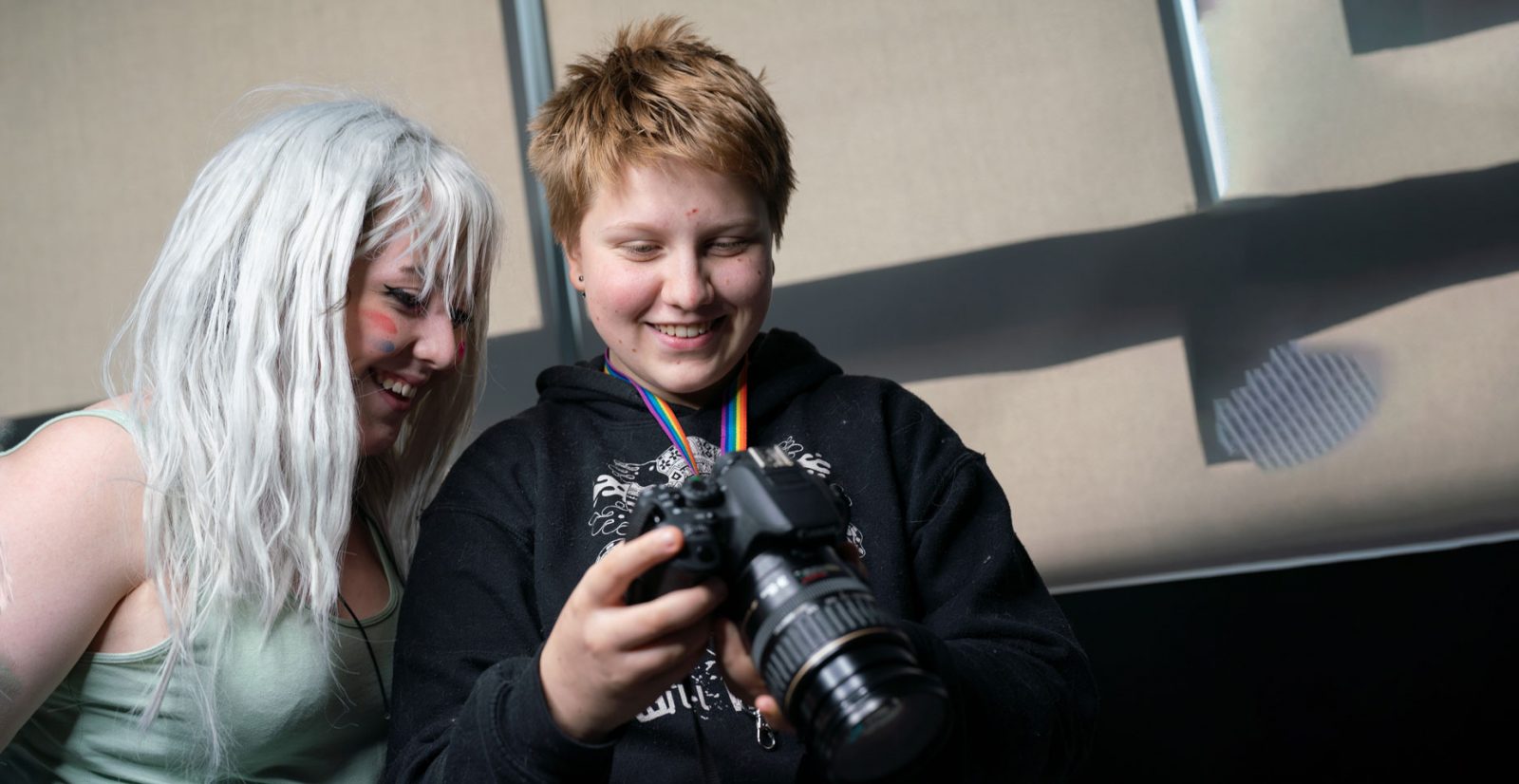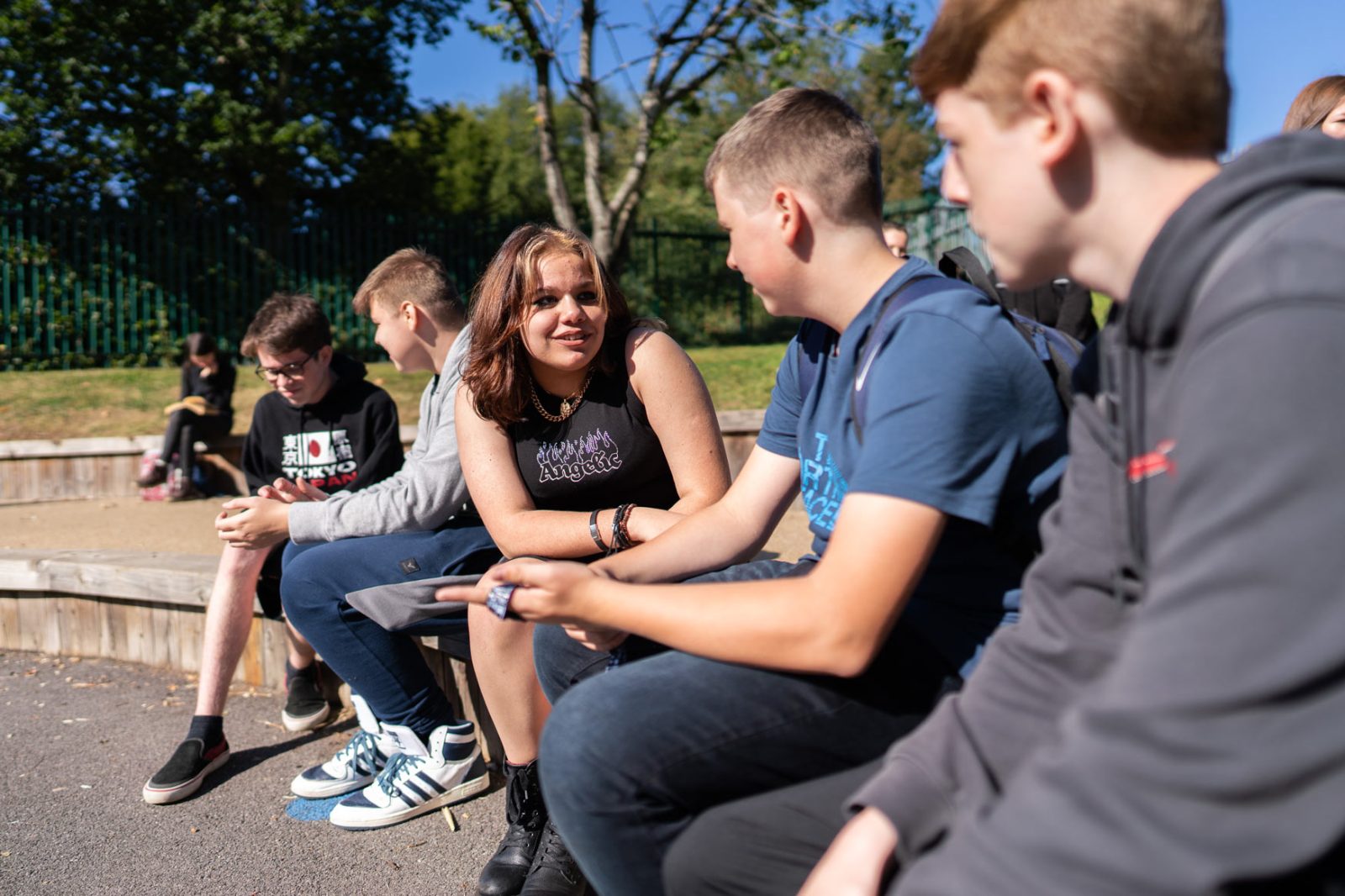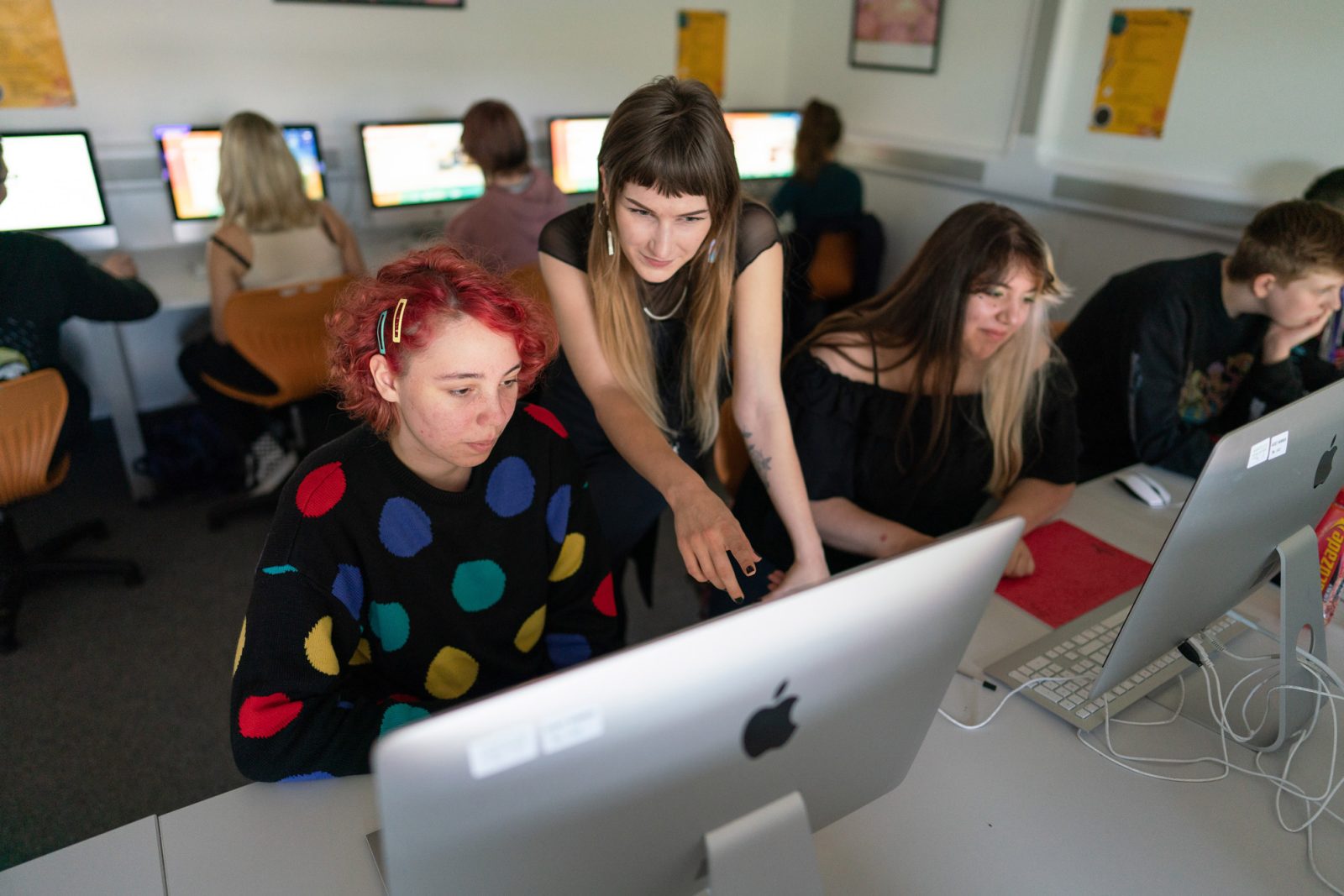Digitech Studio School is committed to safeguarding and promoting the welfare of children and young people. It is our expectation that all staff, volunteers and members of the school community share this commitment.
Meet the team:
Concerns
Concerns about Students
I am a child, and I don’t feel safe.
At the Academy:
- Tell a trusted adult. This could be your Tutor, Pastoral Team or a teacher.
- Ask to speak to a member of the Academy Safeguarding Team
At home or in the community:
- Call and speak to an adult at the Academy on 0117 992 7100
- Email info@digitechstudioschool.co.uk (please note this email account is monitored during term-time school hours)
- Phone Childline on 0800 11 11 any time day or night. They are happy to speak to you about any worries. The call is free.
If you feel you or another child is in immediate danger, please call 999.
Adults:
I am an adult and am concerned about a child.
If you are concerned about a child, you can do one of these things:
- Report it to the Academy’s Designated Safeguarding Lead (Phil de Scossa) by phoning the school on 0117 992 7100 or emailing info@digitechstudioschool.co.uk (please note this email account is monitored during term-time school hours)
- Contact either South Gloucestershire or Bristol Social Services.
For South Gloucestershire:
01454 866000 ‐ Monday to Friday 9am ‐ 5pm
01454 615165 ‐ Out of hours and at weekends
For Bristol:
0117 903 6444 – Monday to Friday 9am – 5pm
01454 615165 – Out of hours and at weekends
In an emergency, please ring 999
For further information, please go to South Gloucestershire’s or Bristol’s website
Category: I am a parent/carer | SafeguardingSouth Gloucestershire Safeguarding (southglos.gov.uk)
Welcome to the Keeping Bristol Safe Partnership website. (bristolsafeguarding.org)
Concerns about Staff
Should you have any concerns in terms of safeguarding relating to the behaviour of a member of staff, you should immediately contact the designated safeguarding team. If the allegation concerns these individuals, you should directly contact Chris Ballard (Principal). Should you feel that your concerns have not been dealt with appropriately by the school or Chair of the School Council, you should contact the Local Authority Designated Officer: Tina Wilson (tel) – 01454 868508
Concerns about the School Site
If you have any concerns regarding the safety of the school site, please contact V Balasco (V.Balasco@clf.uk)
Policy
The School Council and school staff team are committed to keeping our children safe and we regularly review our school policies and procedures to ensure that everything is being done to fulfil our duty of care. The Academy councilor responsible for safeguarding at Digitech Studio School is Rebecca Kemp. All staff are familiar with the government’s guidance for schools – ‘Keeping Children Safe in Education’.
E-Safety
At Digitech Studio School we aim to equip our students with the knowledge, understanding and skills to use information and communication technology creatively and purposefully. A key aspect of this lies in being digitally literate. Online technologies play a huge role at our school and therefore we endeavour to provide a broad and balanced e-safety education so that our students can navigate the online world safely and positively. Students at Digitech learn about e-safety during lessons, tutor time activities, and through regular assemblies conducted by our safety officer Ben Foulger.
To recognise that all students and staff at Digitech understand how to use electronic devices appropriately we all sign the acceptable use policy to promote that we understand the responsibility of using technology recognising how to use them safely and who to go to if we have an issue.
A copy of the acceptable use policy can be found here.
Useful Links to support students and parents with E-Safety
Internet Matters – How to set up parental controls on any electronic device:
Internet Matters – parental controls
CEOP – You can report concerns about grooming an sexual abuse directly to CEOP. Remember, you know your child better than anyone. If you feel something isn’t right, get in touch.
Parents and carers | CEOP Education
Remove a nude image that has been shared online
Online Child Sexual Abuse Parent Guide
Internet Matters – At Internet Matters, parents and professionals can find the most comprehensive and credible resources, information and support to keep children safe online.
Keep Children Safe Online: Information, Advice, Support – Internet Matters
NSPCC – Support for parents/carer
Please also feel free to read this blog on staying safe online. It is an interesting read and very informative on how to protect yourself online.
Bullying
All children and young people have the right to go about their daily lives without the fear of being threatened, assaulted or harassed. Bullying can cause high levels of distress, affecting young people’s well-being, behaviour, academic and social development right through into adulthood. At Digitech Studio School we are committed to creating a safe, purposeful, calm and reflective learning environment in which all students flourish in both phases and reach their full potential equipped with skills for life, and so, bullying of any kind is unacceptable. Bullying is an anti-social behaviour and affects everyone. All types of bullying are unacceptable at our academy and will not be tolerated. All pupils should feel able to tell and know that when bullying behaviour is brought to our attention, prompt and effective action will be taken. Anyone who is aware of any type of bullying that is taking place is expected to tell a member of staff immediately.
Please contact the Year Team/Safeguarding Team using the dedicated email address – info@dssb.clf.uk
Child-on-Child Abuse
Child-on-child abuse is most likely to include, but may not be limited to:
- bullying (including cyberbullying, prejudice-based and discriminatory bullying)
- abuse in intimate personal relationships between children (sometimes known as ‘teenage relationship abuse’)
- physical abuse
- sexual violence
- sexual harassment
- consensual and non-consensual sharing of nude and semi-nude images and/or videos
- upskirting, which typically involves taking a picture under a person’s clothing without their permission
- initiation/hazing type violence and rituals (this could include harassment, abuse or humiliation used as a way of initiating a person into a group
Please contact the Year Team/Safeguarding Team using the dedicated email address – info@dssb.clf.uk
Prevent
Prevent is about safeguarding people and communities from the threat of terrorism. Prevent is one of the four elements of CONTEST, the Government’s counter-terrorism strategy. It aims to stop people becoming terrorists or supporting terrorism.
Incidents of extremism and radicalisation are rare and as such when they do occur, make the news. As with all safeguarding issues, it is important to be vigilant, and not complacent, but also not to panic.
What is extremism and radicalisation?
“Extremism is the vocal or active opposition to our fundamental values, including democracy, the rule of law, individual liberty and the mutual respect and tolerance of different faiths and beliefs. This also includes calling for the death of members of the armed forces.’
Radicalisation refers to the process by which a person comes to support terrorism and extremist ideologies associated with terrorist groups.
We live in a wonderfully diverse world, with both differences and similarities to celebrate. Exploring religious and different social beliefs, in a peaceful and non-violent way, is part of growing up and should not be confused with something more sinister. The best way to PREVENT extremism and radicalisation is by open discussion and increased understanding of each other.
As a parent…
- You know your child better than anybody else. Having open, honest conversations on a regular basis will allow your child to explore new ideas in a safe environment.
- Talk to your child about their online viewing. Social media such as YouTube and Facebook can be used to groom children towards a certain point of view.
- Discuss different points of view concerning topics in the news, modelling that there is always more than one point of view.
- Encourage your child to take an active part in their local community. This could be part of a sports club, social group, volunteering. Getting out, meeting and talking to people around you helps to understand and become part of a community.
As a school…
- All staff have had Prevent training and complete refresher training annually.
- Our safeguarding procedures reflect statutory requirements in the Government’s Counter-Terrorism and Security Act 2015.
- Students are encouraged to discuss and explore issues during Tutor time and Health and Wellbeing lessons.
If you have any concerns that someone you know may be at risk of radicalisation, please contact the local police on 101.
If your concern is of an URGENT nature please dial 999 or the Anti-Terrorist Hotline 0800 789 321
Female Genital Mutilation (FGM) and Honour Based Abuse (HBA)
Female Genital Mutilation
Female genital mutilation is the mutilation of the external female genitalia for non-medical reasons. It is often referred to as female circumcision, ‘cutting’ or ‘sunna’.
Government Statement opposing FGM
Female Genital Mutilation (FGM) is child abuse and an extremely harmful practice with devastating health consequences for girls and women. Some girls die from blood loss or infection as a direct result of the procedure. Some women who have undergone FGM are also likely to find it difficult to give birth and many also suffer from long-term psychological trauma.
UK Law
Female genital Mutilation is a crime in the United Kingdom. Even if a girl is taken abroad to undergo FGM, it is still a crime in the UK if the mutilation is done by a UK national or a UK resident.
It is also a crime if a UK national or resident assists or gets a non-UK national or resident to carry out FGM overseas on a UK national or resident.
If FGM is committed against a girl under the age of 16, each person who is responsible for the girl at the relevant time is guilty of an offence.
Criminal Penalties
Anyone found guilty of an FGM offence – or of helping somebody commit one – faces up to 14 years in prison, a fine, or both. Anyone found guilty of failing to protect a girl from risk of FGM faces up to seven years in prison, a fine, or both.
Support
If you are worried that this might happen to you or someone you know, you can speak to a member of the safeguarding team in school.
Alternatively, you can report this abuse by contacting one of the following:
If there’s immediate danger or if you or someone you know is in immediate danger of FGM, contact the police.
Call 999 to report emergencies or 101 for non-emergencies.
You should also contact the Foreign and Commonwealth Office if you know a British national who’s already been taken abroad.
Foreign and Commonwealth Office: 020 7008 1500
If you or someone you know is at risk you can contact the NSPCC anonymously
NSPCC FGM Helpline
Email: fgmhelp@nspcc.org.uk
Telephone: 0800 028 3550
Female Genital Mutilation Leaflet
Honour Based Abuse
So-called ‘honour-based’ abuse (HBA) encompasses incidents or crimes which have been committed to protect or defend the honour of the family and/or the community, including female genital mutilation (FGM), forced marriage, and practices such as breast ironing. Abuse committed in the context of preserving “honour” often involves a wider network of family or community pressure and can include multiple perpetrators. It is important to be aware of this dynamic and additional risk factors when deciding what form of safeguarding action to take. All forms of HBA are abuse (regardless of the motivation) and should be handled and escalated as such. Professionals in all agencies, and individuals and groups in relevant communities, need to be alert to the possibility of a child being at risk of HBA, or already having suffered HBA.
Child Sexual Exploitation (CSE)
What is Child Sexual Exploitation?
Like all forms of child sex abuse, child sexual exploitation:
- can affect any child or young person (male or female) under the age of 18 years, including 16 and 17 year olds who can legally consent to have sex;
- can still be abuse even if the sexual activity appears consensual;
- can include both contact (penetrative and non-penetrative acts) and non–contact sexual activity;
- can take place in person, via technology, or a combination of both;
- can involve force and/or enticement-based methods of compliance and may, or may not, be accompanied by violence or threats of violence;
- may occur without the child or young person’s immediate knowledge (e.g. through others copying videos or images they have created and posted on social media);
- can be perpetrated by individuals or groups, males or females, and children or adults. The abuse can be a one-off occurrence or a series of incidents over time, and range from opportunistic to complex organised abuse;
- is typified by some form of power imbalance in favour of those perpetrating the abuse. Whilst age may be the most obvious, this power imbalance can also be due to a range of other factors including gender, sexual identity, cognitive ability, physical strength, status, and access to economic or other resources.
Signs of possible CSE include:
- going missing for periods of time or regularly returning home late;
- skipping school or being disruptive in class;
- appearing with unexplained gifts or possessions that can’t be accounted for;
- experiencing health problems that may indicate a sexually transmitted disease;
- having mood swings and changes in temperament;
- using drugs and/or alcohol;
- displaying inappropriate sexualised behaviour, such as over-familiarity with strangers, dressing in a sexualised manner or sending sexualised images by mobile phone (“sexting”);
- showing signs of unexplained physical harm, such as bruising and cigarette burns
Report Child Sexual Exploitation
Child Criminal Exploitation (CCE)
What is Child Criminal Exploitation?
CCE is where an individual or group takes advantage of an imbalance of power to coerce, control, manipulate or deceive a child into any criminal activity (a) in exchange for something the victim needs or wants, and/or (b) for the financial or other advantage of the perpetrator or facilitator and/or (c) through violence or the threat of violence. The victim may have been criminally exploited even if the activity appears consensual. CCE does not always involve physical contact; it can also occur through the use of technology.
Children and young people may be vulnerable to neglect and abuse or exploitation from within their family and from individuals they come across in their day-to-day lives. These threats can take a variety of different forms, including: sexual, physical and emotional abuse; neglect; exploitation by criminal gangs and organised crime groups; trafficking; online abuse; sexual exploitation and the influences of extremism leading to radicalisation.
CCE can include children being forced to work in cannabis factories, being coerced into moving drugs or money across the country (county lines), forced to shoplift or pickpocket, or to threaten other young people.
Signs of possible CCE include:
- persistently going missing from school or home and / or being found out of area;
- unexplained acquisition of money, clothes, or mobile phones;
- excessive receipt of texts / phone calls;
- relationships with controlling / older individuals or groups;
- leaving home / care without explanation;
- suspicion of physical assault / unexplained injuries;
- carrying weapons;
- significant decline in school results / performance;
- gang association or isolation from peers or social networks;
- self-harm or significant changes in emotional well-being
Speak to a member of the academy safeguarding team for further information and advice.
Local Services
Concerned about a child/Young person
Access and Response – South Gloucestershire
01454 866000 Monday to Friday 9-5
01454 615165 out of hours and at weekends
If a child or young person is in immediate danger then please dial 999 and ask for police assistance
First Response – Bristol
0117 903 6444
NSPCC 24 hour Helpline
0800 800 5000 (free from a landline)
NSPCC Text helpline
88858 (service is free and anonymous)
NHS 111
NHS: NHS 111 can help if you have an urgent medical problem
Police
101 non-emergency calls or 999 in an emergency
Young people’s mental health
Off The Record
Free, self-referral counselling service for young people age 11-15, who are experiencing low mood, depression, anxiety, phobias, self-harm, eating problems and/or anger. Young people can call, email or text, and services operate in Patchway, Kingswood and Yate. Also offer parent support groups and sessions. Can also see Facebook, Twitter and Instagram for more information and up to date groups and activities.
Tel: 0808 808 9120.
Home – OTR (otrbristol.org.uk)
Email: hello@otrbristol.org.uk
Kooth
Free, safe and anonymous online support for young people 11-18. Monday – Friday 12pm – 10pm, Saturday – Sunday 6pm – 10pm. On Kooth you can: Chat to our friendly counsellors; Read articles written by young people; Get support from the Kooth community; Write in a daily journal.
Childline
Free counselling via online webchat, and free support/advice available 24/7 via confidential helpline, and emails via the website.
Tel: 0800 11 11
Young Minds
Young Minds national charity offers confidential online and telephone information and support for anyone worried about the emotional, behaviour, or mental health of a child/young person up to 25 years of age, including ADHD, Autism and Aspergers.
Parents Helpline: 0808 802 5544
YoungMinds | Mental Health Charity For Children And Young People | YoungMinds
Young Minds Crisis Messenger Service
Free 24/7 support across the UK of you are experiencing a mental health crisis. Text YM to 85258.
Adult mental health
South Gloucestershire Talking Therapies
Therapeutic interventions including counselling and group courses, in line with people’s differing needs, age 16+. Self-referral via the website.
Tel – 0333 200 1893
Vita Health Group
NHS Talking Therapies – North Somerset & South Gloucestershire (vitahealthgroup.co.uk)
Samaritans
Free, confidential emotional support for those experiencing despair, distress, self-harm or suicidal feelings.
Tel: 116 123 (free, from any phone, 24/7).
Samaritans | Every life lost to suicide is a tragedy | Here to listen
Family/parenting support
NHS website
Advice for parents on a range of parenting issues, including talking to teenagers, fussy eating and teenage aggression.
Parent Buddies
Parent Buddies is a confidential, universal, one-to-one listening service offering short-term support depending on family need. Volunteers are trained to provide parents/carers with listening, and signposting to specialist services.
HOME | My Site (parentbuddies.co.uk)
CCP – Caring for Communities and People
Offer outreach support for families at an early help level. Families can self-refer.
Caring for Communities and People (ccp.org.uk)
Support for families who have children with additional needs
Supportive Parents
Local SEN and disability information service (SENDIAS) Information and support around Special Educational Needs and Disabilities, for children, young people and families.
Tel: 0117 9897725 Mon-Fri 9.30 – 4.30 (answerphone at other times),
South Glos Parents and Carers
Information and groups for parents who have children with a disability and/or additional needs. Offers a weekly drop in for parents and carers, support groups, workshops, counselling and events. They also run the Parent Carer forum in South Gloucestershire to collect feedback and views from families with disabled children.
South Glos Parent Carers (sgpc.org.uk)
Email: team@sglospc.org.uk
JIGSAW Thornbury
JIGSAW Thornbury Support families who have children who are 0-25 years and have any additional needs or disability. This can be anything from learning needs such as dyslexia to complex disabilities or medical problems. Many children who come have no diagnosis. Weekly support group for parents, carers and children + training courses on a range of topics.
Telephone: 01454 416381
Drug and Alcohol Services
Alateen
Support for families and friends of alcoholics
Tel: 0207 403 0888
About us – Al-Anon Family Groups (al-anonuk.org.uk)
FRANK
Support, advice and information on any issues or questions relating to drugs and alcohol 24/365
Helpline: 0300 123 6600
SMS: 8211
Honest information about drugs | FRANK (talktofrank.com)
Domestic Abuse Support Services
Next Link – Domestic abuse telephone help lines are open 8:30am – 5:30pm Monday to Friday and 9:30am – 1:00pm on Saturday
Tel: 0800 4700 280
Contact – Next Link South Glos (nextlinkhousing.co.uk)
Call 999 if a crime is happening now or you’re in immediate danger
Call 101 or Crimestoppers on 0800 555 111
Sexual Abuse and Sexual Violence
SARSAS (Somerset & Avon Rape & Sexual Abuse Support) is a support service for people who have experienced sexual violence at any point in their life.
Women and girls, call 0808 801 0456
Office hours: Monday and Friday, 11am to 2pm, Tuesday, Wednesday and Thursday, 6pm-8.30pm
Men and boys, call 808 801 0464
Office hours: Monday, 11am to 2pm, Tuesday, 6pm-8.30pm
NSPCC Run helpline for victims of sexual abuse in school 0800 136 663
Supporting gender non-conforming and trans youth and their families
Homepage – Mermaids (mermaidsuk.org.uk)
Support/Advice around Finance
Emergency Food Aid
Getting enough to eat | One You South Gloucestershire (southglos.gov.uk)
Groups/Activities
Creative Youth Network
What: ‘Think Better, Feel Better’ workshops based on Cognitive Behavioural Therapy techniques and responsive to the Wellbeing needs of young people.
Where: Creative Youth Network, Kingswood Estate, 20 Old School House Kingswood Foundation Estate Britannia Road, Bristol BS15 8DB
When: Thursday 29th July – 19th August 14:00 – 15:00
At the end of our workshops, young people will receive a Creative Youth Network certificate which will look great on future personal statements for college and University, as well as your CV!
If you’d like to get involved in this opportunity, please get back to us at Charlotte.Little@creativeyouthnetwork.org.uk and owen.barlow@creativeyouthnetwork.org.uk. Or by messaging me on my phone at 07776960009.








